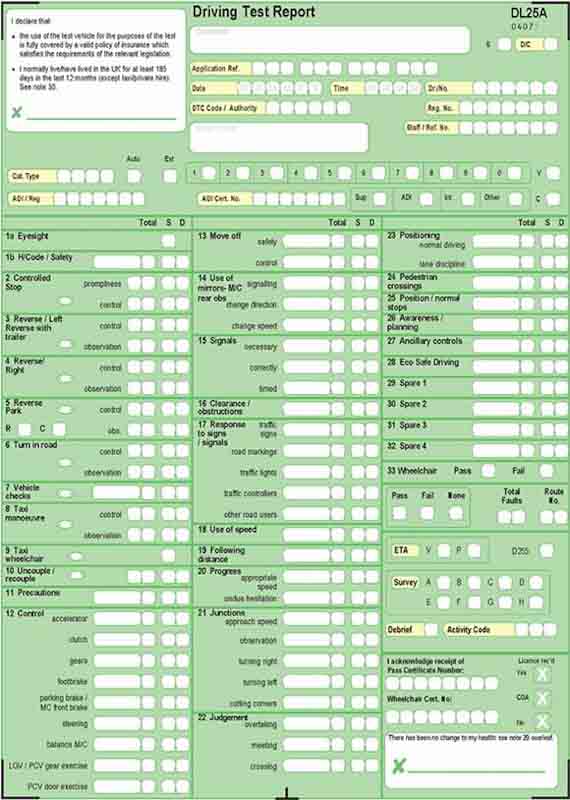There are many occasions when a learner driver can still rescue victory from the jaws of defeat after making a mistake during your driving test.
The key thing to understand is what makes your examiner view a mistake as a fail?
To help you understand what to avoid on your test, we look at what makes a fail and how mistakes can be identified as a major fault.
How many minors can you have and still pass?
In your driving test you can receive 15 minors and still pass, only a major or three of the same minor will result in a fail. If you get more than 15 minors you will fail. There are several driving test minor faults - however, you should try to avoid them to give yourself the best chance of passing.
Driving test major faults
Strictly speaking there is no such thing as a major or a minor fault.
When you make a mistake an examiner will class it as one of the following:
- A dangerous fault - this involves actual danger to you, the examiner, the public or property
- A serious fault - something potentially dangerous
- A driving fault - this isn’t potentially dangerous, but if you keep making the same fault, it could become a serious fault
Both dangerous and serious faults come under what people would normally refer to as a 'major' and just one of either of these faults will result in an instant fail - although you will be expected to continue the test and will only find out the examiner's decision at the end.
All driving test major faults can cause hazardous situations out on the roads and motorways. Be safe, take your time, and remember what your instuctor has taught you.

Learner Driver Car Insurance
Only pay for the cover you need until you’ve passed your test. Get learner driver insurance so you can practice outside of your lessons.


Driving test minor faults list
Here we take a look at some common faults and whether or not they will constitute a fail, some are more clear cut than others, but utlimately it's up to the examiner's discretion to decide if a mistake constitutes a major fault.
Not checking mirrors frequently enough
Not making the necessary observations before moving off or performing a manoeuvre may only warrant a minor, so don’t fret if you feel your observations weren’t clear enough.
Like most minor vs major decisions, it depends on the situation. Again, the examiner will determine whether the lack of observation made completing the manoeuvre potentially dangerous to you, other drivers or pedestrians.
Failing to make the necessary observations at junctions is the most common cause of failing a test outright.
Stalling the car
One of most common driving test mistakes, stalling your vehicle will leave you feeling like you’ve instantly ruined your chances of passing. But in itself, it’s just a minor fault.
If it happens while you’re attempting to start the engine from parked, regain composure, place your handbrake back on and calmly start the car again after checking it is safe to do so.
Make sure to look ahead for pedestrians and other roads users, put the car in first gear, find your biting point and check your mirrors again - moving away when the road is clear.
Stalling is highly unlikely to warrant a major fault – providing it didn’t happen in a potentially dangerous situation.
So be aware that while stalling from parked at the side of a road will usually receive a mere minor, doing so at a busy junction or on a roundabout is more likely to result in a fail.
- How to teach a learner driver - a guide to supervising a friend or family member
- Did you know that we offer specialist black box car insurance?
- How to drive a manual car - a quick and easy guide with pictures
Touching the kerb
Many learners assume that hitting the kerb while performing a manoeuvre will result in an instant fail, but again it’s not entirely true.
While mounting the kerb – or crashing into it hard – will be marked down as a major, a simple touch or clip during a manoeuvre (like turning in the road) is only classed as a minor.
Do though, be extra wary of pedestrians on the pavement.If you hit the kerb with people nearby you’ll likely sweep up that dreaded major.
Hesitation
If you’re unsure when to pull out of a junction, or at a roundabout, you won’t fail for not going at the first viable opportunity. Try to keep your cool and pull out the next time it’s safe to do so.
You won’t get a minor for holding up the flow of traffic if you miss the chance once, or even twice. But be aware if you miss three opportunities to safely pull out then you will likely be issued with a major.
You will also get a major if you pull out when it is deemed not safe to do so.
Using the handbrake incorrectly
As the safest thing to do, candidates often feel they’ll be penalised for not using the handbrake at every opportunity during their test. This isn’t always the case.
While the handbrake should always be applied while parked – and putting the handbrake on in most situations will make the car more secure when stopped – you won’t fail for leaving it off, providing it doesn’t affect the vehicle and cause it to roll backwards or forwards.
Crossing hands over on the wheel
Contrary to popular belief, crossing your hands on the wheel won’t result in your failure.
Examiners look for you to be in control of the vehicle and steering wheel, but this doesn’t mean you’ll automatically fail if you move your hands from the recommended position of around ‘3 and 9 o clock’.
Be aware, it’s no longer recommended to drive with hands in the ‘10 and 2 o clock’ positions – as previously advised by driving instructors. It’s now known that this can result in injury if the car’s airbags are deployed.
Driving too slowly
Naturally, examiners are looking for you to abide by the speed limit.
While many candidates drive slower than needed in a bid to convince the examiner of their safety credentials, going unnecessarily slowly can result in a minor or even a major if it endangers you or other drivers, or causes significant delays.
Driving too slowly also signals to the examiner that you aren’t aware of the speed limit, which could lead to a fail, so speed up if you’re lagging, but never exceed the speed limit.
Failing the sight test
Before you even step foot in the car you’ll be asked to read out a registration plate from 20 metres.
Some candidates wrongly think being unable to read the plate first time is an instant fail. If you can’t read the first plate, the examiner will ask you to read a second – and you won’t actually flunk your test unless you fail to read three plates in a row.
Remember, if you do fail the sight part of the test, you won’t even continue into the driving section. If you did have difficulties first time, shake it off and try not to let it affect you once you get out on the road.
- How to pass your driving test – a full guide from novice to pro
- Road crossings - do you know your pelicans from your toucans?
- Did you know that we offer specialist learner driver insurance?
Making one of these faults once – as long as it isn’t in a dangerous situation – may not cost you your test, but repeating the same mistake multiple times will usually be classed as a serious fault.
While you can receive 15 minors and still pass, three minors for the same mistake will most likely result in a major and a fail.
How to practice for your driving theory test
There are a number of different ways to practice for passing your driving theory test. From sites to apps we have outlined the best resources below so you can find the right tools to suit you.
You can take free driving theory mock tests here on the official Government site.
You can also brush up on your road signs knowledge on our very own road signs quiz page.
As for apps, Driving Theory Test UK is a great place to start, with all necessary learning materials, hazard perception clips and Highway Code info included. You can download it here:
What is a driving test fail?
- How many times you can fail a driving test?
According to the UK Government, there is no limit to how many times you can fail a driving test. However, you will need to wait the mandatory 10 working days between tests before taking another test.
- Can you appeal a driving test fail?
In the UK, you can appeal a failed driving test if you can prove that your examiner did not follow the law when they carried out your test. However, your driving test result cannot be changed
Should you be successful in your appeal, you could receive a refund or free retest. If you are unsuccessful, you could face large legal costs.
You can only appeal the result of a driving test within 6 months of the test date in England and Wales. The time frame in Scotland is within 21 days of the test.
- How long after a fail can you rebook?
Following a failed test, you will need to wait 10 days before you can take the test again. You can book this as soon as you know the result of your previous test. It is advisable to have an extra lesson before retaking to ensure you learn from your mistake in the previous test.
- How long after I pass can I start driving?
You can start driving immediately! However, please remember to take out car insurance and breakdown cover. You should receive your physical licence within 3 weeks. If you don’t, contact the DVLA.
- What to do if your driving test is cancelled?
A driving test can be cancelled due to dangerous weather, problems with your car, illness of the instructor or for a few other reasons that will be relayed to you should this happen. The DVSA will automatically book the next available date for your test or send you the details for the new test within 3 working days of the cancellation. You can change the date if it’s not suitable for you.
- Can you fail a driving test on bay parking?
You can fail your driving test by incorrectly bay parking the vehicle. This is one of the three potential manoeuvres you can face in your driving test. Learn more about how to bay park here.
- How long after failing driving test can I rebook?
You can rebook immediately after failing a driving test - however, you will need to wait 10 days before retaking.
- Can you fail driving test on a manoeuvre?
Yes, you can have a ‘major’ fail in your driving test doing one of the three manoeuvres. Learn how to pass your driving test here.
Get 30 driving tips that will save you money
Running a car isn’t cheap, but there are some easy things you can do to keep your costs down. Get these tips and more useful driving articles sent straight to your inbox now.





























